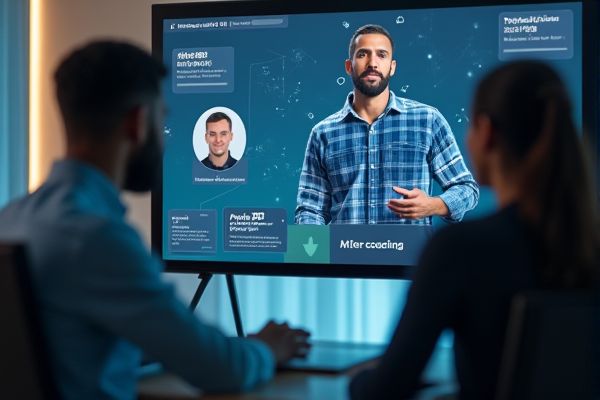
AI-driven personal coaching utilizes algorithms to assess individual behavior patterns, offering personalized feedback based on real-time data analysis. Machine learning models can track progress over time, adapting coaching strategies to optimize goal achievement. Advanced natural language processing allows AI to engage in meaningful conversations, making guidance more intuitive and accessible. Users benefit from tailored resources and insights, enhancing motivation and fostering growth in various aspects of life.
AI usage in personal coaching
Personalized Learning
AI usage in personal coaching can enhance the learning experience by tailoring strategies to individual needs. For instance, platforms like CoachAccountable may utilize data-driven insights to optimize client engagement and accountability. Personalized learning through AI can adapt educational content based on a learner's progress and preferences. This targeted approach increases the likelihood of achieving set goals and improving overall outcomes.
Data-Driven Insights
AI usage in personal coaching offers the potential for data-driven insights to enhance client progress. By analyzing performance metrics, coaches can tailor their approaches to individual needs, leading to more effective outcomes. For instance, an application like MyFitnessPal can provide detailed nutritional feedback, aiding fitness coaches in providing precise advice. This data-centric approach may increase the chance of achieving client goals such as weight loss or improved athletic performance.
Adaptive Feedback
AI can enhance personal coaching by providing adaptive feedback tailored to individual needs and progress. This technology analyzes user behavior and adjusts recommendations, making it possible for a more personalized experience. For instance, a fitness coaching app might employ AI to suggest workouts based on a user's performance over time. The potential for continuous improvement in coaching effectiveness is significant, as AI can identify patterns and areas for enhancement that human coaches may overlook.
Goal Tracking
AI can enhance personal coaching by providing tailored goal tracking features that adapt to individual progress. For example, apps like Noom utilize AI to analyze user behavior and suggest personalized plans, increasing the likelihood of achieving fitness targets. This technology offers real-time feedback, helping users stay accountable and motivated in their pursuits. By leveraging AI, individuals may find greater success in reaching their personal and professional objectives.
Behavioral Analysis
AI's application in personal coaching enhances behavioral analysis by offering real-time insights into user patterns. For instance, a coach may utilize AI tools to assess client interactions, pinpointing areas for improvement. This technology allows personalization of strategies based on individual behaviors, potentially leading to more effective outcomes. The chance for clients to achieve their goals could increase with targeted recommendations derived from data analysis.
Emotion Recognition
AI usage in personal coaching can enhance the effectiveness of sessions by providing real-time feedback on clients' emotional states. For example, emotion recognition technology can analyze facial expressions and voice intonations to gauge client feelings during a coaching session. This capability allows coaches to tailor their approach based on the emotional data gathered, increasing the likelihood of achieving better outcomes. By integrating AI tools, personal coaching can evolve to meet individual needs more precisely, potentially leading to a stronger coach-client relationship.
Virtual Accountability
AI can enhance personal coaching by offering tailored feedback and support based on individual progress. For instance, platforms like BetterUp leverage AI to track users' development and suggest personalized strategies. Virtual accountability features can help users stay committed to their goals, providing reminders and motivation through automated prompts. The combination of AI insights and real-time tracking could significantly improve the effectiveness of personal coaching experiences.
Progress Monitoring
AI can enhance personal coaching by providing tailored feedback based on individual performance data. For instance, a fitness app can analyze user activity to suggest personalized workout routines. Progress monitoring tools powered by AI can identify trends and areas for improvement, potentially increasing motivation. Users might find that tracking their progress through AI technologies offers a clearer pathway to achieving their goals.
Skills Development
AI can streamline personal coaching by providing tailored feedback based on individual performance data. For example, platforms like BetterUp leverage AI algorithms to analyze user progress and suggest specific skill development activities. The potential for improving learning outcomes through personalized learning pathways is significant. Coaches can focus their efforts on areas where clients show the most potential for growth.
Time Management Optimization
AI can enhance personal coaching by providing tailored feedback and insights based on individual performance data. For instance, an AI-driven application can analyze a user's task completion patterns to suggest optimal time management strategies. This personalized approach increases the likelihood of achieving set goals, such as improved productivity at work. Institutions that adopt such technologies may see higher success rates among their coaching programs.
 techknowy.com
techknowy.com